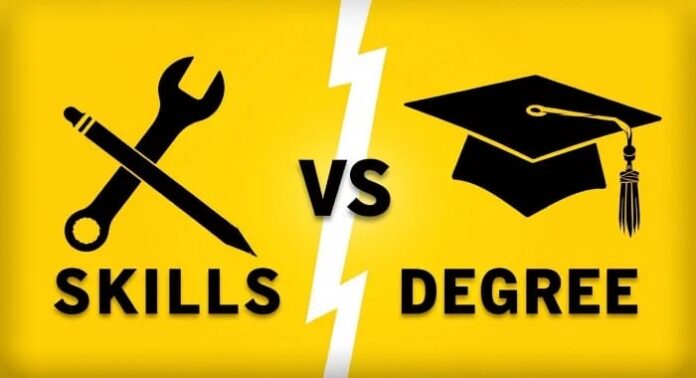Skills or degrees?, by Victoria Yakubu
The question of whether skills or degrees hold more importance has been a topic of heated discussion among Nigerians, particularly on social media platforms, for quite some time now. While some argue that possessing a degree is the key to success, others insist that acquiring skills is the way forward.
However, the real question is, why must we choose between the two? This dichotomy has sparked intense debate, with each side presenting compelling arguments. On one hand, degrees provide a solid foundation in a specific field, demonstrating one’s commitment and understanding of theoretical concepts.
Degrees open doors to various career opportunities and are often a prerequisite for many professions. Moreover, degrees equip individuals with critical thinking, problem-solving, and research skills, essential for navigating complex work environments.
However, critics argue that degrees alone are no longer sufficient in today’s fast-paced, ever-evolving work environment. They point to the numerous graduates struggling to find employment, despite holding impressive academic credentials. This has led many to question the relevance of degrees in the modern job market.
On the other hand, skills enable individuals to apply theoretical knowledge practically. They make one more employable, increasing their chances of securing better job opportunities. In today’s economy, skills such as coding, digital marketing, and data analysis have become highly sought after. Many successful entrepreneurs and professionals attribute their success to acquiring valuable skills, rather than relying solely on their degrees. Moreover, skills provide adaptability and flexibility, allowing individuals to pivot into different industries and roles.
Rather than pitting degrees against skills, why not combine the two? Students should strive to acquire relevant skills while pursuing their degrees. This synergy will make them more attractive to potential employers and better equipped to tackle real-world challenges. Universities and institutions can play a vital role by incorporating practical training and internship programmes into their curricula. This hands-on experience will enable students to apply theoretical knowledge in real-world settings, bridging the gap between academics and industry requirements.
READ ALSO: When degree and skills collide; common sense to the rescue, by Sani Bello Hamza
The acquisition of skills and knowledge should not stop after graduation. Professionals must continually update their skills to remain relevant in their respective fields. This mindset of lifelong learning will foster adaptability and resilience. Furthermore, vocational training and technical education should be encouraged and valued equally with traditional degree programmes. This will provide individuals with specialised skills, enhancing their employability and contributing to the country’s economic growth.
To address the skills gap, the government and private sector must collaborate to provide training programmes, scholarships, and apprenticeships. This support will empower individuals to acquire in-demand skills, boosting the nation’s economic competitiveness. Moreover, policymakers should re-evaluate the education system to focus on producing well-rounded individuals with both theoretical knowledge and practical skills. By doing so, we can create a workforce capable of driving innovation and growth.
The education system should prioritise practical skills, theoretical knowledge, and lifelong learning. Educators and industry leaders must work together to develop curricula that reflect industry needs. This collaboration will ensure graduates are equipped with the skills required to succeed in the modern job market. Moreover, students should be encouraged to explore various fields and interests, developing a range of skills that make them adaptable and versatile.
In conclusion, the debate should not be about skills or degrees, but rather how to effectively combine both to produce competent, adaptable, and innovative professionals. As we navigate the rapidly changing landscape of work, we must prioritise practical skills, theoretical knowledge, and lifelong learning. By doing so, we can create a workforce that drives economic growth, innovation, and prosperity for Nigeria.
Ultimately, the future of work depends on our ability to adapt and evolve. By combining degrees and skills, we can empower individuals to succeed in an ever-changing world. It is time to shift the focus from the debate to finding solutions.
Students, educators, policymakers, and industry leaders must work together to create a workforce that combines the best of both worlds – degrees and skills. Only then can we unlock the full potential of Nigeria’s human capital.
Victoria Yakubu is a student of Mass Communication at the Muhammadu Buhari University of Maiduguri (formerly University of Maiduguri), Borno State.
Follow the Neptune Prime channel on WhatsApp:
Do you have breaking news, interview request, opinion, suggestion, or want your event covered? Email us at neptuneprime2233@gmail.com





